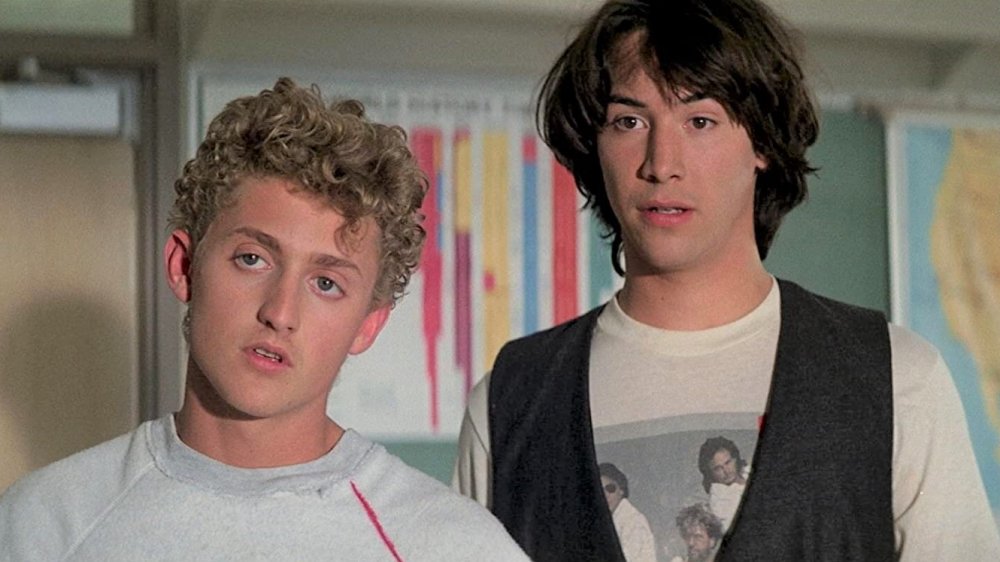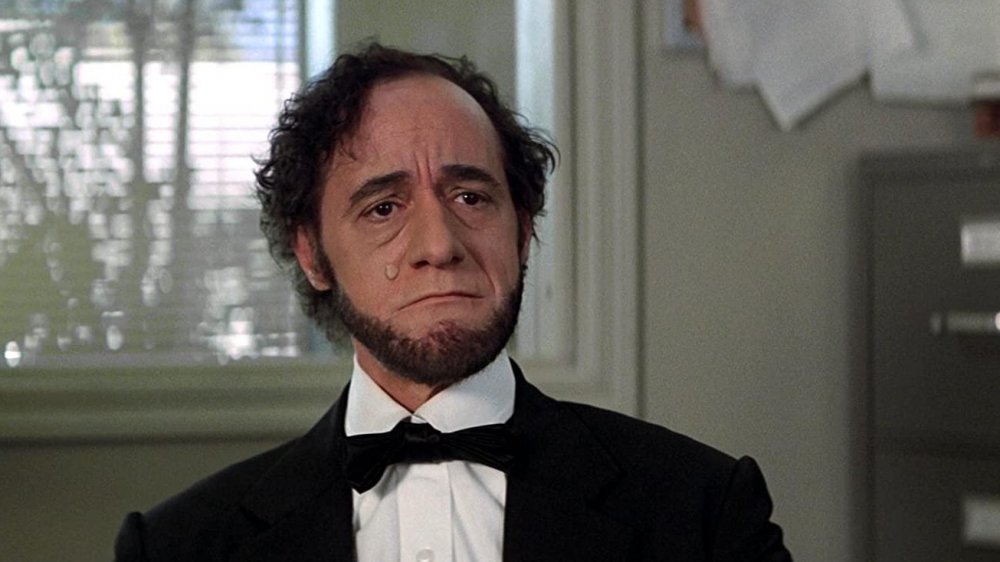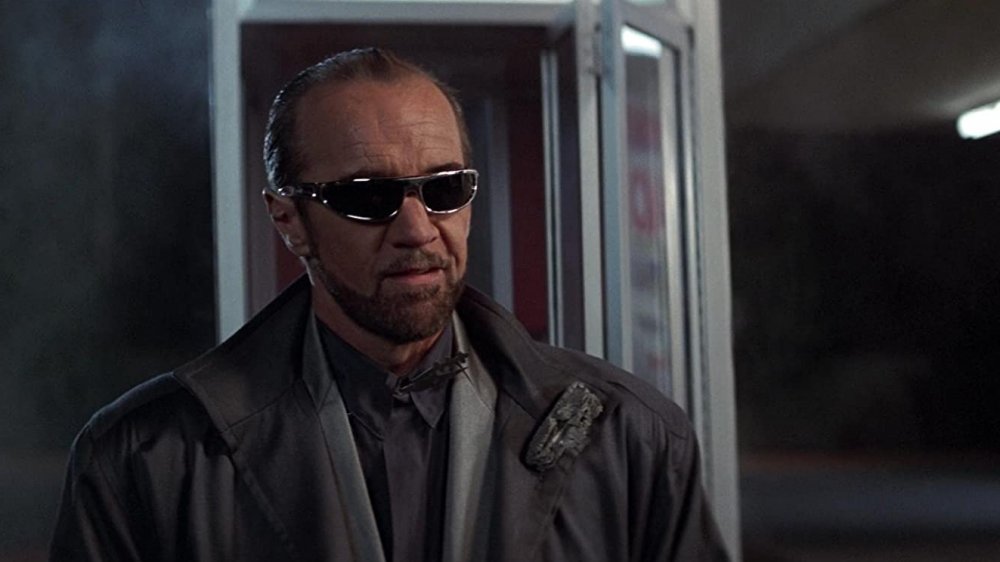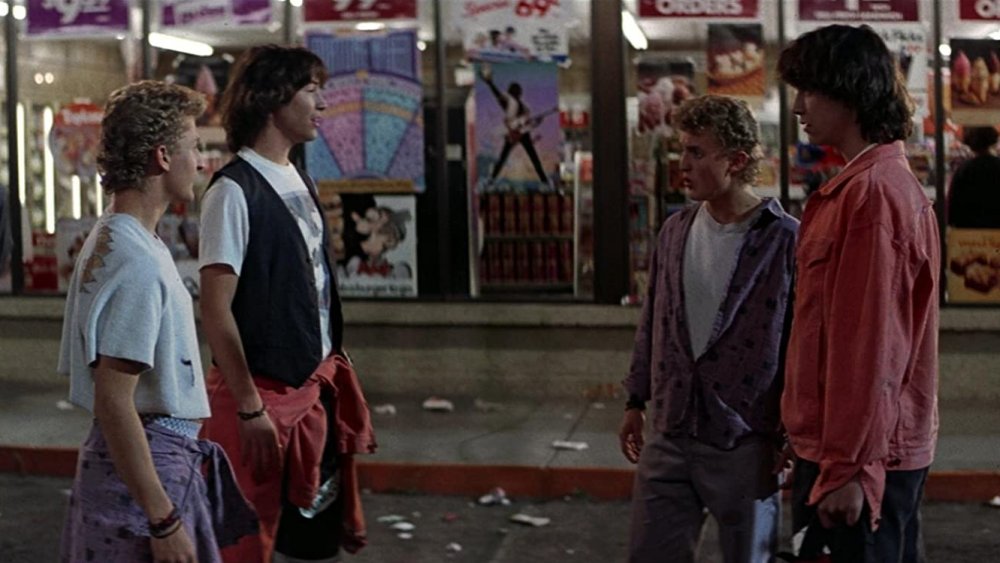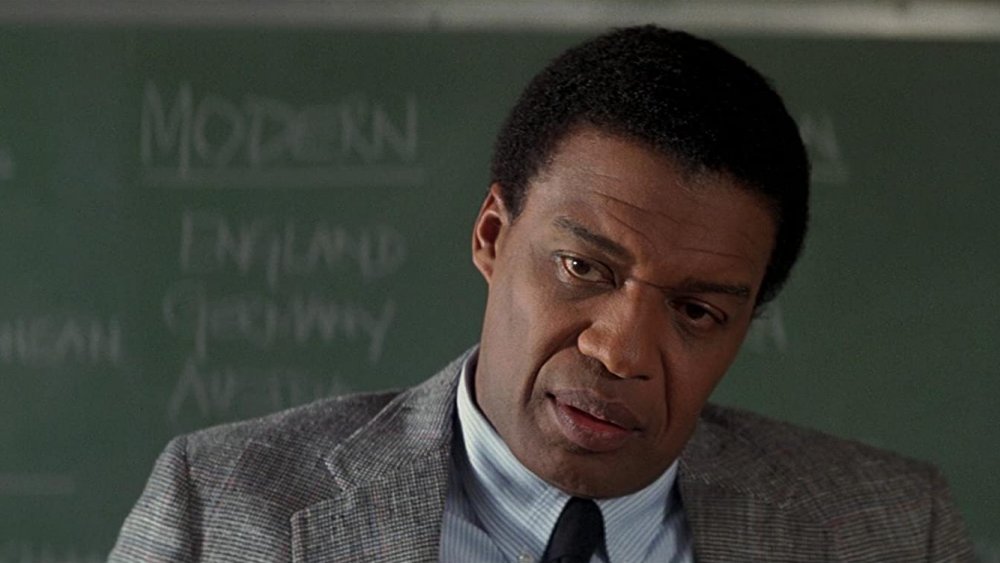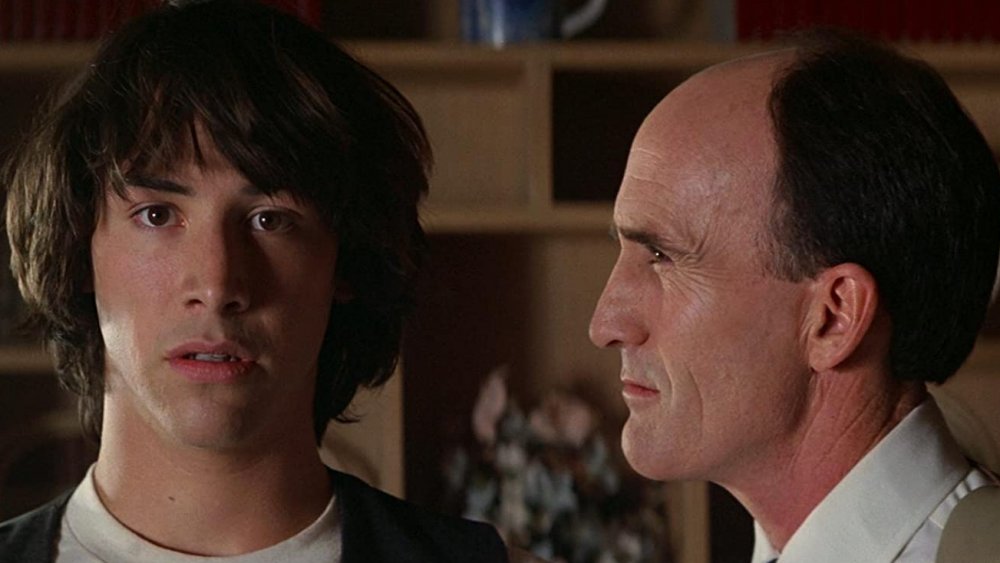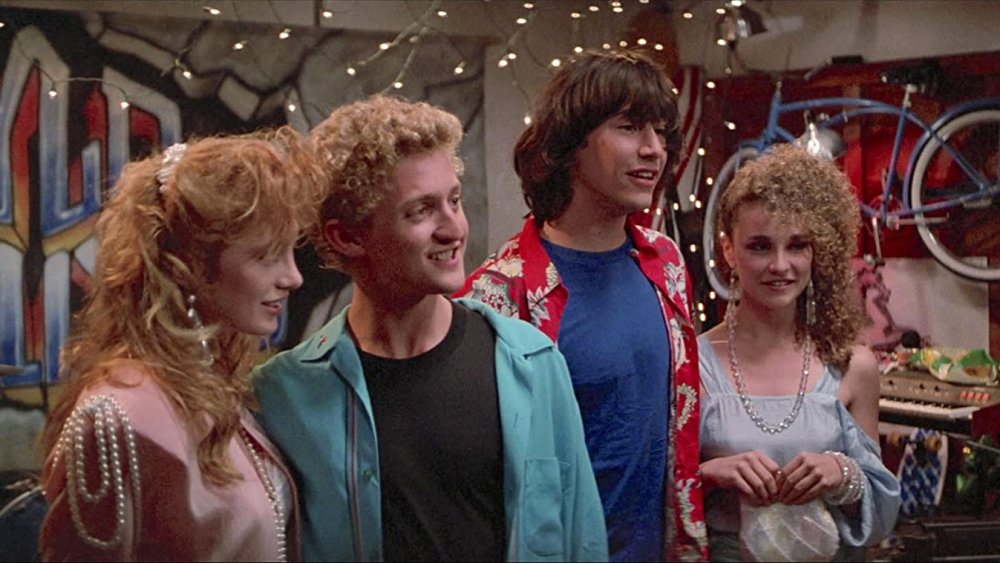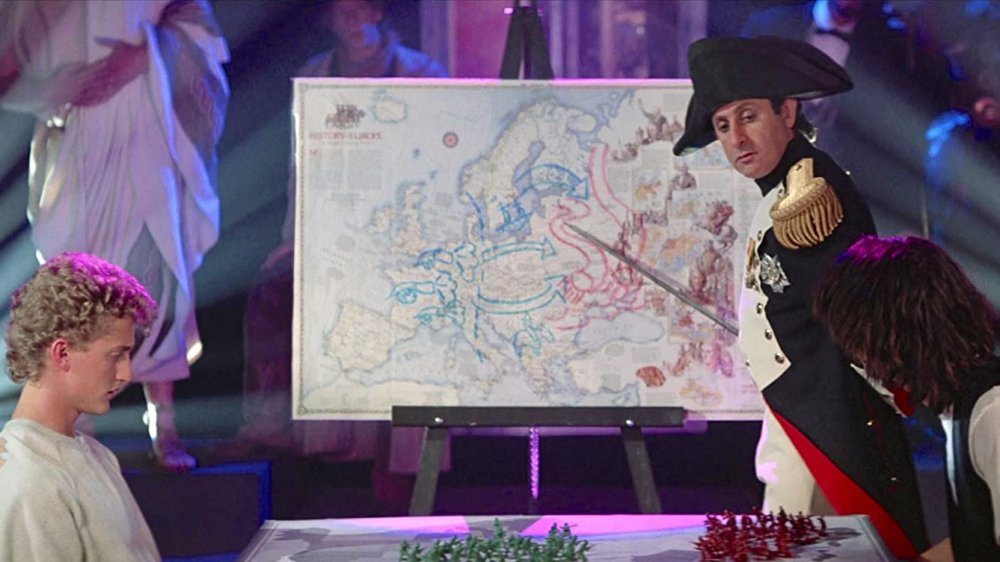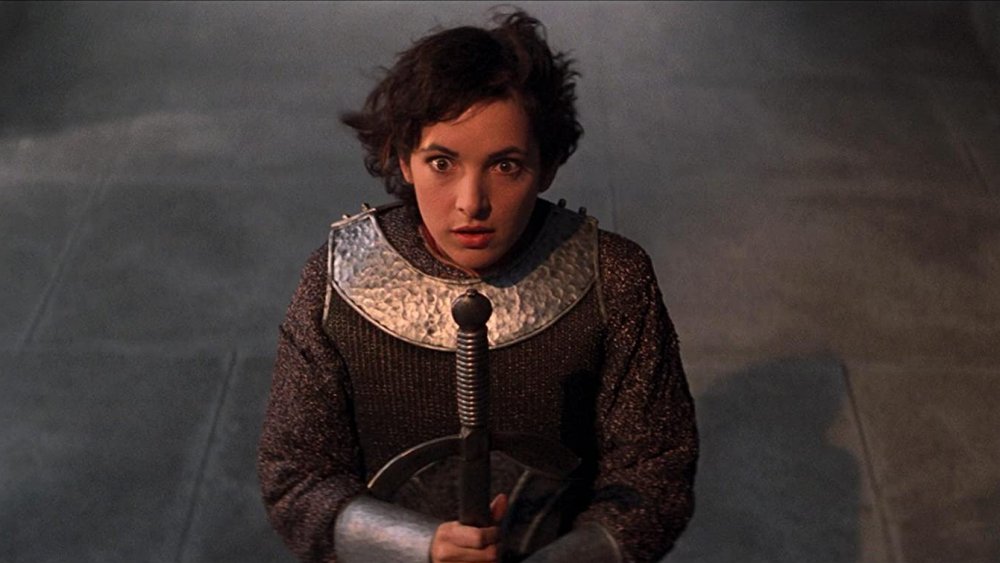Things Only Adults Notice In Bill And Ted's Excellent Adventure
In 1989, one of the most compulsively rewatchable movies of the 1980s arrived, and Bill and Ted's Excellent Adventure has been a part of our lives ever since. The film tells the story of two best friends — Bill S. Preston, Esq. and Ted "Theodore" Logan — who want nothing more than to rock out as the founding members of the greatest band of all time, the Wyld Stallyns. The trouble, apart from being unable to actually play any instruments yet, is that they're facing the possibility of never being able to play together again unless they can pass a history report that's due in less than 24 hours. Their solution arrives in the form of a phone booth-riding time traveler named Rufus, who offers them the chance to journey through history in search of historical icons they can use to make their report perfect.
Over the course of several decades, Bill and Ted has remained a classic in no small part because it's the kind of film the whole family can enjoy. It's grown-up enough that adults will appreciate its self-aware sense of humor, but fun and tame enough that the kids in the room will also get a kick out of its time-hopping adventure. Of course, having fans of all ages means there are some things in Bill and Ted that only older viewers pick up on. From historical implications to weird family dynamics, these are things only adults notice in Bill and Ted's Excellent Adventure.
Bill and Ted's strange stepmom situation
Though most of Bill and Ted's Excellent Adventure focuses on the title characters as they journey through time, the film does begin with a peek into their home lives. It's here that we learn that Bill has a stepmother named Missy, who's so young that she was a senior in high school when Bill and Ted were freshmen. Though the film doesn't spend a lot of time on Missy's place in the story, it does nod in the direction of a few things that make Bill's relationship with Missy ... complicated.
At first, it seems Ted is the only one of the duo who's willing to remember that Missy used to just be a girl they knew in high school, while Bill would rather forget that and would definitely rather not have Ted drooling over his stepmom. In a later scene, though, even Bill has to be reminded that the woman he's staring uncomfortably at is his stepmother. Then, of course, there's Missy's apparently genuine attraction to older, academic men. We see it in Bill's father, but we also see it in response to Bill and Ted's history teacher, Mr. Ryan, who Missy both remembers fondly and seems very happy to see at the end of the film. These are all just brief moments, but they certainly paint a picture of a stepson/stepmother relationship that's a little unconventional at best. Still, everyone seems more or less comfortable around each other.
There's a lot of historical tragedy about to happen
Over the course of their excellent adventure, Bill and Ted meet and befriend a number of historical figures and bring them back to participate in their history report at San Dimas High School. Because the film is a comedy, it doesn't spend a lot of time digging into the implications of this, but any adults who've even studied history a little bit know that there are many worth unpacking ... and not all of them are fun to think about.
For example, Bill and Ted bring back several major historical figures who died suddenly and violently. Abraham Lincoln was assassinated in the spring of 1865, Socrates was executed by forced poisoning in 399 BC, Joan of Arc was burned at the stake in 1431 before she reached her 20th birthday, and so on.
Again, Bill and Ted's Excellent Adventure is a comedy, and it's also a film that's meant to portray history as a cool thing full of interesting stories, so it makes sense that the film doesn't dig too deep into what happens to these figures from history after they leave San Dimas. The adults in the room know, though, that Joan's plan to institute an aerobics program for French soldiers probably isn't going to work out.
Rufus and the Great Ones
The film begins with a prologue in which Rufus, Bill and Ted's time-traveling helper, refers to the two young men as "the Great Ones" and explains that he's about to go and intervene at a time when they need a little push in the right direction. Over the course of the film, we learn that Bill and Ted are destined to become the most important musicians in history, as the work of their band, the Wyld Stallyns, will one day serve as the basis of an entire utopian society in the far future.
Rufus' role in the film is to make sure that happens by going back and helping Bill and Ted pass their history report, which ensures they will stay together in San Dimas and begin making music. The ability to time travel back to this crucial moment in Wyld Stallyns history and the fact that Rufus and company know how important it is naturally raises another question. Have Rufus or any of the other future leaders gone back before to look at other key moments in the lives of Bill and Ted? Did Rufus ever, for example, hop back into the past and give them a Van Halen album at a key moment? Have time travelers examined their early childhood development? Was Bill's parents splitting up an important event for Rufus to study? The film doesn't tell us, but the fact that future Wyld Stallyns devotees can just jump in a time machine certainly raises the questions.
Adults might wonder how time works in the film
In order to help facilitate their successful history report, Rufus offers Bill and Ted the use of a time machine disguised as a phone booth. As he explains how the machine works, he's also careful to explain that no matter where in time they go, they're still facing a ticking clock. Time will continue to flow normally for them, which means they still only have a matter of hours to complete their history report. We're reminded of this when Ted tells his past self that he should remember to wind his watch so they don't forget how much time they have left.
This detail is useful because it puts restrictions on Bill and Ted's time travel and gives the story higher stakes, but it also raises another amusing question. Bill and Ted are still moving in real time (that is, their real time) as they journey through history, but how does the journey affect the flow of time for the historical figures? Does Napoleon arrive back in 19th-century France a few hours after he left, or are Bill and Ted able to return him the exact moment they took him?
Bill and Ted's overall school performance
Bill and Ted become heroes over the course of Bill and Ted's Excellent Adventure because, regardless of their shortcomings, they come off as genuinely well-intentioned guys. They want to be successful in life, even if they're not entirely sure how to do that, and when they're tasked with working harder to rise to the occasion, they seem ready to do the work, even if their version of that is trying to study by asking random people in a parking lot what they know about history. They're not lazy, necessarily, just a little misguided.
The whole film hinges on how the boys are doing in history, where their performance is so bad they run the risk of failing if they do anything but nail their final report. This dire situation, combined with the way Bill and Ted carry themselves outside of class, begs a question that adults in the room might end up asking themselves. How are these guys doing in their other classes? They certainly have a unique command of language, so perhaps their English homework looks better than history? Is Bill secretly a wiz with numbers? Do they manage to pull it together in biology or chemistry? We don't spend enough time on their academic lives to find out, but Bill and Ted are certainly capable of being disciplined when they have to be.
Adults might notice some lax parenting in Bill and Ted's Excellent Adventure
In the grand scheme of things, Bill and Ted have to ace their history report so they can stay together, play in a band, and set themselves on a course to becoming the luminaries of a future society. On a smaller scale, they're also just two friends who are eager to stay close, keep hanging out in front of the Circle K, and work on getting Eddie Van Halen to play in their band.
Whichever goal you're more interested in, it all hangs on the history report because Ted's father has made it very clear that if he fails in school this time, he'll be shipped off to military school, no matter what. Kids in the wrong, particularly teenagers, are likely quite familiar with this particular brand of struggle on some level, but adults might be noticing something else.
Ted's father is a strict man. He's a cop who believes in discipline and order, and he's clearly eager to give his son a taste of some of that, so much so that he's already called the military school he's got his eye on. If that's the case, though, why didn't he try to straighten Ted's academic life out sooner? Why wait until his son is on the verge of failing to take such a heavy hand? It might just be pure frustration, but Ted's dad is also showing that he might not be paying enough attention to his kid.
Wait ... did they totally alter English history?
Because Excellent Adventure is a very light sci-fi comedy adventure that never takes itself too seriously, the film also takes certain liberties with the way history unfolds. This is particularly evident in the story of the princesses, who are both inventions of the film and a potential opening for Bill and Ted to have fully changed history.
Early on in the film, future Ted tells his slightly younger self that he should give his love to the princesses. Later on, when Bill and Ted wind up in 15th-century medieval England, they meet said princesses, Joanna and Elizabeth, just as they're about to be married off to some "royal ugly dudes." The film also briefly mentions that Bill and Ted would seem to be hanging out in one of "King Henry's" castles, and the pair are very nearly executed by said king before they're able to escape with the help of Billy the Kid and Socrates.
So ... which King Henry is it? If we're going by English history, several King Henrys lived in the 1400s, but only Henry IV and Henry VII had daughters, only one was named Elizabeth (she died young), and none were named Joanna. Why haven't we heard of these princesses? Perhaps because Rufus "rescued" them from the past and brought them to San Dimas, thus wiping them from English royal history.
Napoleon's military strategy
Bill and Ted spend much of their excellent adventure traveling through thousands of years of history, making a few key stops along the way and bringing historical figures back to San Dimas with them. What the film doesn't tell us, though, is exactly what impact, if any, their travels had on various civilizations after the adventure was over. We know that Rufus later went and brought the princesses from England in the past to San Dimas in the present, but other than that, it's all left up to the imagination. Still, some historical figures have bigger plans than others.
Of all the historical figures in the film, Napoleon is the one who spends the most time in the modern era. He hangs out for almost a full day in San Dimas and spends a lot of time at the local water park, Waterloo, where he has a blast. By the time of the history report, Napoleon has become so infatuated with water slides that he's planning a new strategy for invading Russia based on them, as he reveals with a map and toy soldiers while Bill and Ted watch. When Ted says he doesn't think the strategy will work, Napoleon grows frustrated, and the film ends before we can learn who might be right. So, did Bill and Ted improve Napoleon's military mind by bringing him to the present, or did they ruin it? Was he an even more successful commander, or did he lose his empire even more quickly?
How did Bill and Ted impact their historical friends?
At its core, Bill and Ted's Excellent Adventure is a journey of friendship as the two title characters travel through time and learn not just a few basic facts about major historical figures but how to appreciate history as a world of exciting and nuanced stories. Most of the film is devoted to that emotional journey, but Bill and Ted aren't the only ones taking a big, life-changing trip. Each of the historical figures who come with Bill and Ted, beginning with Billy the Kid and Socrates, go on their own trip in which they presumably also learn and grow. We see this first when Billy the Kid picks up on some of their language tics, but that's far from the end of the learning experience.
So, what does everyone ends up taking back with them? Well, Billy was also very keen on that football the boys were carrying around. Perhaps he'll make one of his own in the Old West? Joan of Arc was very into aerobics, while Beethoven was big into synthesizer sounds on keyboards. If they have the time, they'll find ways to apply these interests when they get back, and the future will inform the past in some small but significant ways.
